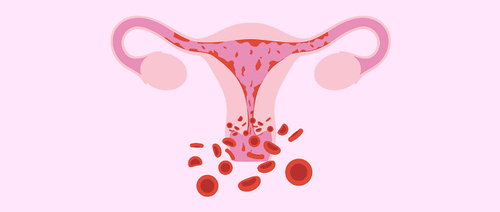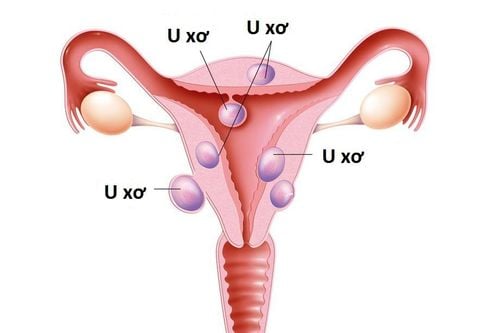This is an automatically translated article.
Submucosal fibroids are common in women of reproductive age. This is a dangerous type of fibroid that, if not treated in time, can affect fertility.
1. Submucosal fibroids
Submucosal fibroids are one of the types of uterine fibroids. Fibroids emerge in the uterine cavity, and fibroids that grow just below the lining of the uterus grow toward the uterine cavity. Submucosal fibroids may have a fibrous polyp stalk, sometimes growing around the uterine cavity with a gradual tendency towards the vagina. In some cases, submucosal fibroids grow toward the abdomen.
Submucosal fibroids often do not present with typical signs or symptoms. However, some signs may occur such as:
Irregular menstruation Menorrhagia , menorrhagia Delayed menstruation Black menstrual blood clots The above symptoms often persist and affect the life of women. women. Furthermore, heavy blood loss during menstruation can lead to fatigue, dizziness, fainting, and even death. In addition, prolonged anemia also leads to complications related to cardiovascular diseases,...

Hình ảnh U xơ tử cung dưới niêm mạc
2. Are submucosal fibroids dangerous?
Submucosal fibroids are dangerous fibroids, if the patient is not detected early and treated in time, it can affect future fertility.
2.1 Effect of submucosal fibroids on pregnant women Premature birth: women with submucosal fibroids are more prone to preterm delivery, which usually occurs when submucosal fibroids develop. The growth of the uterus compresses the uterus, making the space for the fetus to grow narrow. Along with the increase in estrogen during pregnancy, pregnant women are more likely to give birth prematurely or even have a miscarriage. Miscarriage, stillbirth: When the ovaries are compressed and the endometrial layer is not fully developed due to fibroids, the uterus will be less elastic. From there, it leads to miscarriage or abnormal stillbirth. Poor fetal growth: The larger the submucosal fibroids grow, the more the blood and nutrition supply from the mother to the fetus is affected. Therefore, the condition of the fetus will be underdeveloped, and lead to fetal malnutrition. Difficulty giving birth: Submucosal fibroids compressing the uterus will make the delivery process of pregnant women quite difficult. Placental abnormalities: Abnormalities in the placenta such as the presence of placenta previa, placenta previa,... Uterine fibroids will cause the uterine lining to thicken or be damaged, causing danger. danger to the mother and fetus. The occurrence of placental abnormalities can cause life-threatening bleeding during childbirth. Tumor rupture: As the fetus grows larger, it will easily compress the uterus. In many cases, causing the fibroid to rupture is very dangerous. Endometritis: After birth, the tumor continues to grow, and this creates favorable conditions for bacteria. Therefore, it can easily lead to infection.
2.2 Effect of submucosal fibroids on non-pregnant women Causes abdominal pain and profuse discharge: When submucosal fibroids grow larger and larger, causing compression and pain in the abdomen. lower abdomen. During menstruation or during sex, the pain will increase more, more intense. In addition, when the vagina is damaged, it also causes more moisture, discomfort for the patient and makes the patient more susceptible to gynecological infections. Dysmenorrhea with menorrhagia: Submucosal fibroids appear, causing menstrual cycle disturbances. Prolonged menorrhagia easily causes the patient to lose a lot of blood and affects the patient's health. Fatigue: Submucosal fibroids cause uncomfortable symptoms, weakness, and psychological stress, anxiety, and fatigue, Urinary disorders: Submucosal fibroids The fascia enlarges, compressing neighboring organs such as the bladder, leading to urinary retention, urinary frequency, or constipation. Difficulty giving birth, infertility: Submucosal fibroids grow large, hindering the process of sperm meeting the egg to fertilize, easily leading to infertility. Carcinoma: The state of cancer in people with submucosal fibroids is rare but not absent. Some cases of cancer because fibroids are not treated to grow for a long time.

U xơ tử cung dưới niêm mạc có thể gây ra tình trạng rong kinh
3. Methods of treating submucosal fibroids
There are many treatments for submucosal fibroids. The choice of the appropriate method will depend on the disease state, comorbidities, locality, tumor location and other clinical symptoms. Some methods are applied to treat submucosal fibroids such as:
3.1 Medical treatment Medical treatment is usually applied to patients with fibroids but no signs of complications. The extent of the tumor is not too dangerous when the tumor is small, and is no more than 5cm in size. Some drugs are often prescribed by doctors to treat submucosal fibroids such as:
Duphaston Progesteron Orgametril Noristera 3.2 Surgical treatment Surgery is a radical method including twisting and removing fibroids, removing the nucleus pulposus. fibroids or partial or total hysterectomy.
The embolization method: is a method to block the arteries feeding the fibroids, only applicable to cases with rich vascular tumors. This method is often advised for patients who do not want to become pregnant and have children anymore. Non-invasive MRI HIFU: is a progressive treatment that removes abnormal target tissue without surgery. This method does not affect the reproductive health of the patient. However, the disadvantage of this method is the cost.
Submucosal fibroids are a dangerous disease that, if not detected early and treated promptly, can cause the patient to lose fertility. Therefore, women of reproductive age need to have regular check-ups, especially gynecological exams, so that abnormalities can be detected early and appropriate treatment measures are taken for each stage.
To meet the needs of women's health examination and to ensure women's health, Vinmec International General Hospital now has a basic gynecological examination and screening package to help customers: early disease of inflammatory diseases makes treatment easy and inexpensive; Screening for early detection of gynecological cancer (cervical cancer).

Khám phụ khoa tại Vinmec là sự lựa chọn của nhiều chị em phụ nữ hiện nay
Gynecological Specialist Examination Transvaginal Uterine Ovarian Ultrasound Vaginal Bilateral Breast Ultrasound Tests such as: Treponema pallidum test rapid, Chlamydia rapid test, taking samples for cervical-vaginal cytology, bacterioscopic staining (female vaginal fluid), HPV genotype PCR automated system, Total urinalysis by automatic machine.
Please dial HOTLINE for more information or register for an appointment HERE. Download MyVinmec app to make appointments faster and to manage your bookings easily.













